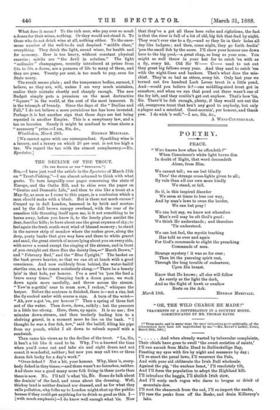THE DECLINE OF THE TROUT.
[TO THE EDITOR OF THE "SPECTATOR."]
SIR,—I have just read the article in the Spectator of March 17th on" Trout-Fishing,"—I am almost ashamed to think with what gusto. To turn languidly over pages concerning the state of Europe, and the Oaths Bill, and to skim even the paper on "Genius and Domestic Life," and then to rise like a trout at a May-fly, as soon as I come to this paper, is a confession which a man should make with a blush. Bat is there not much excuse ? Cooped up in dull London, hemmed in by brick and mortar, and by the dull brown canopy overhead, with the roar of its ceaseless tide thrusting itself upon me, is it not something to be borne away, before you know it, to the lonely place amidst the dear, familiar hills ; to have about one the great expanse of sky; to feel again the fresh south-west wind of blessed memory ; to stand in the narrow strip of meadow where the rushes grow, along the deep, peaty banks that give way here and there to white gravel and sand, the great stretch of moors lying about you on every side, with never a sound except the singing of the stream, and in front of you straight out there flies the dainty line,—" March Brown," and "February Red," and the "Blue Upright." The basket on the back grows heavier, so that we can sit at lunch with a good conscience. And now suddenly from behind, the water-bailiff startles one, as he comes noiselessly along,—" There be a beauty lyin' in that hole, yer honour. I've a seed 'en 'pon the feed a brave many times." Creeping back a dozen paces, we work down again more carefully, and throw across the stream. " Yew'm a-gettin' near to mum now, I reckon," whispers the keeper. Before the sentence is finished, there is—not a rise, but the fly sucked under with scarce a sign. A turn of the wrist- " Ah, yew a-got 'en, yer honour !" Then a spring of three feet out of the water. Then down, down, sulkily ; but the pressure is a little too strong. Here, there, up again. It is no use ; five minutes down-stream, and then tenderly leading him to a shelving gravel, in a moment more he lies on the bank. "I thought he was a fine fish, tew," said the bailiff, filling his pipe from my pouch, whilst I sit down to refresh myself with a sandwich.
Then came his views as to the decline of the trout. "La, Sir, it ben't a bit like it used to be. Why, I've a-knowed the time when you'd come out and take six and eight dozen and not count it wonderful, neither ; but now you may call two or three dozen fish lucky for a day's work."
"Over-fished Not a bit, your honour. Why, bless 'e, every- body fished in they times,—and there wasn't no licenshes, neither. And there was a good many more folk living in these parts than there is now. No. I'll tell 'e 4at 'tis, Sir. Some do talk about the drainin' of the land, and some about the dressing. Well, thickey land is neither drained nor dressed, and as for what they calls pollution, why folks up to London might shut up the public. houses if they could get anything for to drink so good as this. I— [with much emphasis}—I do know well enough what 'tis. Now
that they've a got all these here rules and riglations, the fact is that the river is full of a lot of old, big fish that feed by night. They won't ever rise to a fly,—and so they lie in their holes all day like badgers ; and then, come night, they go forth feedin' 'pon the small fish by the score. I'll show your honour one down here to the big pool,—a great chap, so long as your arm. You might so well throw in your hat for to catch 'en with as a fly, every bit. Old Sir W— C— used to net out they great big fellows every year. And they used to catch 'em with the night-lines and bankers. That's what does the mis- chief. They'm so bad as otters, every bit. Only last year we turned out five hundred Loch Leven trout in a little pond. And—would you believe it ?—one middling-sized trout got in somehow, and when we ran that pond out there wasn't one of the fry left, and they couldn't get out anyhow. That's how 'tie, Sir. There'd be fish enough, plenty, if they would net out the old, overgrown trout that ben't any good to anybody, but only a plague and a mischief. Good-mornin', yer honour, and thank yew. I do wish 'e well."—I am, Sir, &c., A WEST-COUNTRYMAN.


































 Previous page
Previous page